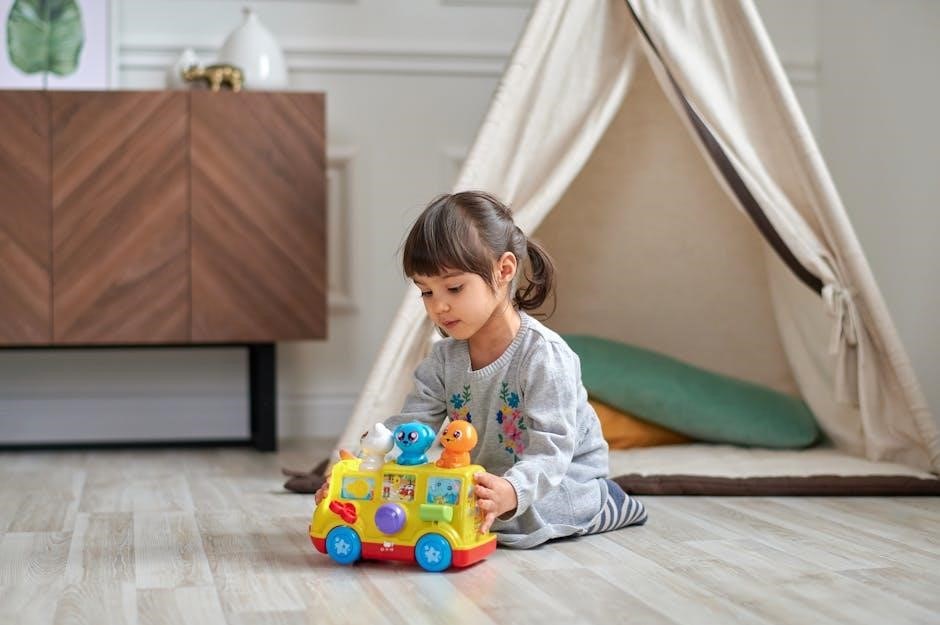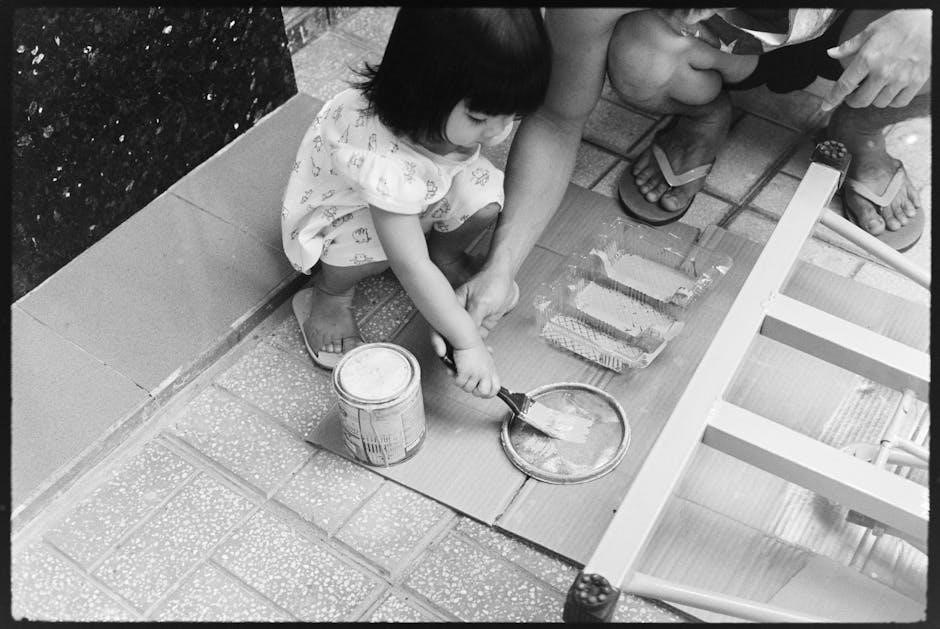Happiness is a skill that can be cultivated through practice, transforming lives by fostering joy and fulfillment regardless of circumstances.
Defining Happiness and Its Importance
Happiness is more than a fleeting emotion; it is a skill that fosters mental well-being and life satisfaction. By cultivating happiness, individuals can enhance their resilience, relationships, and overall quality of life. It is not merely a feeling but a mindset that allows people to embrace challenges and opportunities with optimism. Developing this skill is crucial for achieving one’s potential and living a fulfilling life.
Understanding Happiness as a Developable Skill
Happiness is a skill that can be developed through intentional practice and effort. It is not merely a feeling but a capacity that can be cultivated over time. Like learning to play an instrument or speak a new language, happiness requires consistent practice to master. By rewiring the brain and adopting positive habits, anyone can enhance their ability to experience joy and resilience. This skill empowers individuals to navigate life’s challenges with greater ease and optimism.
The Science Behind Happiness
The science behind happiness reveals it as a cultivable skill, supported by neuroscience and practices like mindfulness and gratitude, leading to lasting joy and well-being.
The Neuroscience of Happiness
Matthieu Ricard, a molecular biologist turned Buddhist monk, highlights that happiness is rooted in brain function. Neuroscience shows that practices like mindfulness and gratitude can rewire the brain, enhancing joy. The prefrontal cortex, particularly the left side, plays a key role in positive emotions. By training the mind to focus on the present and cultivate compassion, individuals can strengthen neural pathways associated with happiness, leading to lasting well-being and life satisfaction.
The Role of Genetics vs. Environment in Happiness
While genetics influence baseline happiness, research shows environment and intentional practices play a larger role in cultivating joy. Happiness isn’t hard-wired but can be developed through skills like gratitude and mindfulness. Environmental factors, such as supportive relationships and personal growth opportunities, significantly shape happiness levels. By focusing on practices that foster well-being, individuals can overcome genetic predispositions and create a fulfilling life aligned with their values and aspirations.
Practical Strategies for Cultivating Happiness
Cultivating happiness involves practical strategies like mindfulness, gratitude, and intentional practices that foster joy and well-being. These methods help rewire the brain for sustained joy and fulfillment.
Mindfulness Meditation and Its Impact on Joy
Mindfulness meditation is a powerful practice that rewires the brain to enhance joy. By focusing on the present, it reduces stress and negative emotions, fostering emotional resilience. Regular mindfulness practice increases gray matter in brain areas linked to happiness, improving emotional regulation and well-being. This skill helps cultivate gratitude, optimism, and calm, leading to a more joyful and fulfilling life.
The Power of Gratitude Practice
Gratitude practice is a transformative tool for cultivating happiness. By focusing on what we already have, it shifts our mindset from scarcity to abundance, fostering contentment. Regularly acknowledging life’s positives boosts serotonin and dopamine levels, enhancing joy and resilience. Simple acts like journaling or sharing thanks can rewire the brain, reducing stress and negativity. Gratitude practice strengthens relationships and builds a foundation for lasting well-being, making it a cornerstone of happiness development.

The Role of Meditation in Happiness Development
Meditation reshapes brain patterns, enhancing emotional well-being and fostering joy. Regular practice cultivates mindfulness, reducing stress and nurturing a positive mindset, essential for sustained happiness.
How Meditation Rewires the Brain for Joy
Meditation reshapes brain structure and function, fostering joy. Neuroplasticity increases grey matter in areas linked to happiness, compassion, and emotional regulation. Regular practice boosts serotonin and dopamine, enhancing mood. It calms the amygdala, reducing stress responses, and strengthens neural pathways for positivity. Over time, meditation cultivates a resilient, joyful mind, transforming suffering into opportunities for growth and well-being.
Simple Meditative Exercises for Daily Practice
Daily meditation can be simple yet profound. Start with mindful breathing: focus on each breath for five minutes. Practice body scan meditation, releasing tension. Loving-kindness meditation cultivates compassion by visualizing kindness toward oneself and others. Gratitude reflection involves focusing on positive aspects of life. These exercises, even in short sessions, enhance mental clarity, emotional balance, and joy, fostering a calm and resilient mind.

The Importance of Daily Habits in Sustaining Happiness
Daily habits, such as meditation and exercise, create routines that foster joy and well-being, helping to maintain mental and emotional balance over time.
Crafting Activities and Their Connection to Happiness
Crafting activities, such as knitting, quilting, or reading, offer a profound connection to happiness. Engaging in these creative practices fosters mindfulness and a flow state, which enhances well-being. Research shows that such activities can reduce depression and anxiety by 30-50%, promoting mental health. The sense of accomplishment and creative expression from crafting cultivates joy and emotional resilience, making them a valuable tool for sustaining happiness in daily life.
The Impact of Physical Health on Mental Well-being
Physical health significantly influences mental well-being, as regular exercise and healthy habits boost mood and resilience. Studies show that physical activity releases endorphins, reducing stress and anxiety. A balanced lifestyle, including proper nutrition and sleep, supports mental health, fostering a positive outlook. By prioritizing physical health, individuals strengthen their mental resilience, creating a foundation for sustained happiness and emotional stability.

Creating a Personalized Happiness Plan
A personalized happiness plan involves setting realistic goals, identifying core values, and creating actionable steps to align daily habits with long-term well-being aspirations.
Steps to Develop a Tailored Happiness Plan

Start by clarifying your reasons for seeking happiness and identifying your strengths and weaknesses. Set realistic, achievable goals aligned with your values. Incorporate daily practices like mindfulness, gratitude, and empathy. Regularly assess and adjust your plan to reflect personal growth and changing circumstances. Celebrate progress, no matter how small, to stay motivated. Consistency and patience are key to fostering lasting joy and well-being in your tailored approach to happiness.
Setting Realistic and Achievable Goals
Setting realistic and achievable goals is foundational to developing happiness skills. Start by identifying clear, specific objectives aligned with your values. Break larger goals into smaller, manageable steps to ensure progress. Regularly track your advancements and celebrate milestones to stay motivated. Avoid overly broad or unrealistic expectations, as they can lead to discouragement. Focus on incremental growth and adapt your goals as needed to align with your evolving priorities for sustainable happiness.

The Six Sustainable Happiness Skills
Happiness is built on six core skills: empathy, gratitude, mindfulness, self-awareness, kindness, and a growth mindset, fostering lasting joy and personal growth.
Empathy and Its Role in Happiness
Empathy, the ability to understand and share others’ emotions, fosters deeper connections and compassion. Practicing empathy enhances joy by cultivating kindness and harmony in relationships. By actively listening and perspective-taking, empathy strengthens social bonds, promoting a sense of belonging and well-being. Developing empathy as a habit enriches emotional intelligence, leading to more meaningful interactions and a supportive environment. This skill is vital for sustained happiness, as it nurtures mutual understanding and fosters a positive, inclusive community.
Cultivating a Growth Mindset
A growth mindset is the belief that abilities and intelligence can be developed through effort and learning. This perspective fosters resilience, motivation, and a positive outlook, directly contributing to happiness. By embracing challenges and viewing setbacks as opportunities for growth, individuals cultivate a sense of purpose and fulfillment. Matthieu Ricard emphasizes that mental training, including adopting a growth mindset, is essential for developing life’s most important skill—happiness. This mindset helps navigate life’s challenges with optimism and determination.
The Interplay Between Mental and Physical Health
Mental and physical health are deeply interconnected, with physical well-being enhancing mental clarity and mental resilience boosting physical strength, together fostering overall happiness.
How Physical Health Influences Happiness
Physical health significantly impacts happiness by enhancing mental resilience and emotional well-being. Regular exercise, such as walking, boosts mood and energy levels, while neglecting physical health can lead to emotional struggles. A healthy body supports a clearer mind, fostering joy and life satisfaction. Prioritizing activities that promote physical and mental harmony is essential for sustaining long-term happiness and overall well-being.
Mental Health Practices for Sustained Joy
Mental health practices are vital for sustained joy, as they foster emotional balance and resilience. Techniques like mindfulness meditation and gratitude journaling help cultivate positivity. Recognizing and embracing emotions, rather than suppressing them, promotes inner peace. Developing empathy and self-compassion strengthens relationships and self-awareness. Regular mental exercises, such as reflection and visualization, enhance emotional well-being, leading to a more joyful and fulfilling life. Prioritizing mental health ensures long-term happiness and personal growth.

Happiness in the Context of Education and Labor Markets
Happiness is increasingly recognized in education and labor markets as a vital skill, fostering resilience, productivity, and well-being in professionals amidst global changes and digitalization.
The Role of Skills Development in Modern Education
Skill development is central to modern education, equipping students with adaptability and emotional intelligence in a rapidly changing world. As automation and digitalization reshape labor markets, fostering happiness as a skill becomes crucial. Educators emphasize cultivating empathy, mindfulness, and a growth mindset to prepare students for future challenges. By integrating happiness skills into curricula, education systems empower individuals to thrive, fostering resilience and creativity in both personal and professional realms. This approach ensures holistic development, aligning academic success with mental well-being and employability in a competitive global landscape.
Happiness as a Factor in Professional Success
Happiness is increasingly recognized as a key driver of professional success. By fostering emotional intelligence, resilience, and creativity, happy individuals excel in leadership roles and build stronger workplace relationships. Harvard Business School even offers courses on managing happiness, highlighting its importance in leadership. Cultivating joy enhances productivity, collaboration, and decision-making, making it a vital skill for thriving in competitive environments. Happier professionals tend to achieve greater satisfaction and long-term career fulfillment.
Happiness, as a skill, transforms lives through mindful practices, gratitude, and self-awareness, offering a pathway to lasting joy and fulfillment in both personal and professional realms.
Summarizing the Key Takeaways
Happiness is a skill developed through intentional practices like mindfulness, gratitude, and empathy. Neuroscience shows it rewires the brain for joy, emphasizing that happiness isn’t solely genetic but cultivable. Balancing genetics and environment, sustainable skills like gratitude and growth mindsets foster well-being. Daily habits, physical health, and mental practices further sustain happiness, proving it’s a lifelong journey of self-awareness and intentional effort.
Motivation to Continue Practicing Happiness Skills
Happiness is a skill that empowers us to transform our lives through intentional practice. Recognizing that joy is within our control fosters sustainable motivation. By embracing mindfulness, gratitude, and empathy, we cultivate inner strength and resilience. Small, consistent efforts lead to profound changes over time, inspiring us to continue nurturing this vital skill. Motivation grows as we experience the interconnectedness of mental and physical well-being, encouraging us to embrace the journey of lifelong happiness.
